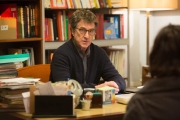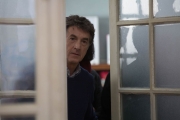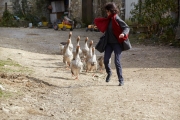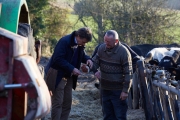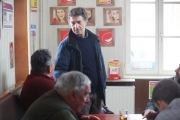![]() Presentation by and discussion with actress Marianne Denicourt
Presentation by and discussion with actress Marianne Denicourt
In this small corner of rural France, everyone counts on Jean-Pierre, the general practitioner who examines them, treats them and reassures them day and night, seven days a week. When Jean-Pierre is diagnosed with a serious illness, Nathalie, a newly certified doctor turns up from the hospital to give him a hand. But will she be able to adjust to this new life and will the irreplaceable Jean-Pierre be able to step aside?
• César nomination for the Best Actor: François Cluzet, 2017 •
Cast & Crew
Director • Thomas Lilti
Director of Photography • Nicolas Gaurin
Screenwriters • Thomas Lilti and Baya Kasmi
Music composers • Alexandre Lier, Sylvain Ohrel and Nicolas Weil
Producers • Emmanuel Barraux and Agnès Vallée
Starring :
Marianne Denicourt, François Cluzet …
Choose a picture to see the filmography (source : IMDB)
![]()
You were a hospital practitioner in Hippocrates and now you are a country doctor in Médecin de Campagne. Same trade, same role, or is it very different?
There is a huge difference between these two roles and the two types of practice. In my case, the commitment was very different. In Hippocrates, I had hardly any medical procedures to perform. The power struggles between members of the medical staff were more important than the doctor-patient relationship. It is the exact opposite in Médecin de Campagne. I had to do a lot of preparation before playing this part. I learned several basic procedures from a general practitioner: taking blood pressure, using a stethoscope, taking a pulse, listening to a patient. From a nurse, I learned how to place a tourniquet, various dressings, cleaning wounds, stitches… I even did a first aid course with the emergency services. Once I knew all that, it made it easier to concentrate on my role once I was on the set. Following on from Hippocrates, Thomas Lilti did me a great honour by offering me the part before even writing the screenplay. I was therefore able to work on this character for two years before shooting starting. That gave me an extraordinary amount of freedom as well as a huge responsibility. Thomas was very receptive to my suggestions and I am grateful for his trust in me. It was tremendous to be involved in the invention of a character to this extent.
In Un Métier Idéal, John Berger describes the country doctor as a hero. Did you have the feeling you were a true hero?
Prior to reading John Berger’s book, I had read books by Marie Didier, in particular Contre Visite and Dans la Nuit de Bicêtre. Later on, I met the author who – as well as being an excellent writer – is also a doctor. I discovered the light within her, the beautiful relationships she has with her patients, her face, her brave truth… For me, Marie Didier is a true heroine. She was one of my sources of inspiration. As for the book by John Berger and the photographer Jean Mohr, it is indeed magnificent. You can clearly see the extraordinary devotion of the country doctor.
That devotion is shared by Doctor Werner in the film.
Yes, it is that devotion to serving his patients that François Cluzet played with such remarkable strength of personification. Working on Médecin de Campagne allowed me to get to know him better; he is extremely kind, frank and generous. He is an actor who enjoys teamwork. He and I both believe that the source of creativity lies in one’s relationships with others and sharing. François wanted us to work on every scene with Thomas, so he could define the challenges and analyse the evolution of the relationship between us.
In the film, you are not the usual age for a backup doctor. You already have a history…
Playing a part is like an equation with lots of x values. There are loads of things to be studied. We sometimes use reality to build a part. At Alès hospital, I met a woman who – after being a nurse – started studying medicine. I remembered her when I worked on the part of Nathalie. It is Nathalie’s mystery, what is she doing here? Why is she trying so hard even though Werner does everything he can to discourage her? She is obviously someone who has suffered and who is reborn from this suffering, who does not really have any choice, either. Perhaps that is what a vocation is: commitment, a sort of necessity.
We should mention that she goes back home, to her father’s house. As if she is finding her roots…
Yes, you are absolutely right. She has the strength of those who have already lived and it is not a bunch of vindictive greenhorns who are going to make her give up.
Meantime, she also worked as an emergency doctor…
Thomas insisted on that, probably because of the scene with the mayor, when he injures himself and has to have emergency treatment in the middle of the night.
Yes, it is an important scene where we see that the knowledge passing between Doctor Werner and Nathalie is reciprocal. She knows certain procedures that he doesn’t.
This scene takes place just as he seems to have decided to let Nathalie go. At that point, he realizes he needs her and their relationship changes.
With regard to the actors working with you, do you consider them as actors or rather as patients?
Acting means duplicating oneself and believing it. It is very strange. All of a sudden, I found that I was a doctor faced with a patient and I believed it! I must say that all the actors I was with were astoundingly convincing.
Press Kit “Médecin de campagne”
English ~ 5 pages ~ 406 Ko ~ pdf
Press Kit “Médecin de campagne”
French ~ 11 pages ~ 406 Ko ~ pdf




